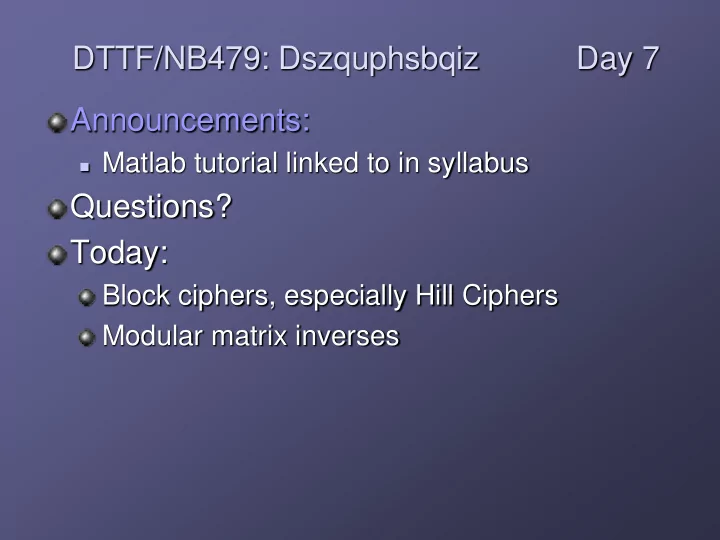

DTTF/NB479: Dszquphsbqiz Day 7 Announcements: Matlab tutorial linked to in syllabus Questions? Today: Block ciphers, especially Hill Ciphers Modular matrix inverses
1 Block Ciphers So far, changing 1 character in the plaintext changes ___ character(s) in the ciphertext. Shannon outlined qualities of good ciphers: Diffusion: Changing one character of the plaintext changes _____ characters in the ciphertext Makes frequency analysis much tougher! Confusion: Each character of the ciphertext interacts with several parts of the key Block ciphers have both qualities: DES (64 bits), AES (128 bits), Hill ciphers (smaller; today)
2 Hill Ciphers Lester Hill, 1929. Not used much, but is historically significant: first time linear algebra used in crypto Use an n x n matrix M. Encrypt by breaking plaintext into blocks of length n (padding with x’s if needed) and multiplying each by M (mod 26). 1 2 3 Example: Encrypt “ hereissomeonetoencrypt” using M = 4 5 6 M her eis som eon eto enc ryp txx 11 9 8 ( 7, 4, 17) (4, 8, 18) … (19, 23, 23) 1 2 3 ( ) ( ) ≡ 7 4 17 4 5 6 2 5 25 mod 26 11 9 8 (2, 5, 25) (0, 2, 22) … (0, 22, 15) cfz acw yga vns ave anc sdd awp “CFZACWYGAVNSAVEANCSDDAWP”
3 Decrypting Reverse the process, multiplying each block by M -1 (mod n) Theorem: If a matrix M is invertible mod n, then gcd(det(M), n) = 1 Proof on board
4-6 Modular matrix inverse (§3.8) The Hill cipher requires us to invert a matrix mod 26. For a 2x2 matrix, this is easy. Many numerical packages allow us to invert a matrix, but using floating point numbers. How do we combine the two? Demo of my code
7-8 How to break via known plaintext? Let P be plaintext, M be the n x n encryption matrix and C be the ciphertext. Answering Q7 preps you to do 2.13 #14 on HW2 if you want to earn an early day
Recommend
More recommend